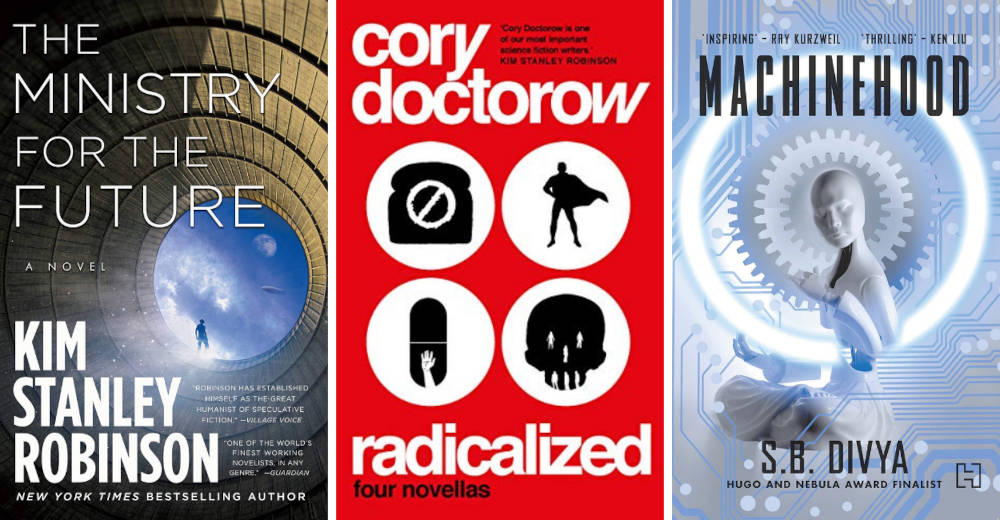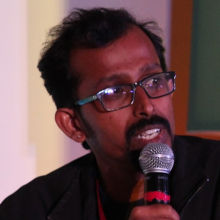In the classic 1966 science fiction novel, Flowers for Algernon, Daniel Keyes makes the following statement: “That's the thing about human life—there is no control group, no way to ever know how any of us would have turned out if any variables had been changed.”
The statement rings true, but then, on the other hand you have science fiction, the genre that is the “literature of ideas”.
In popular imagination, the term “science fiction” evokes spaceships and superheroes, but there’s more to sci-fi than space battles and ray guns. Among them, the role of science fiction in examining society and our collective futures by imagining “what if…?”.
That said, while the stories themselves may be set in the future, what science fiction examines is the present with Tomorrow just being a lens through which we examine Today. When seen in this light, science fiction helps us understand our world, societies, and our relationships with each other and with technology in a narrative that is more engaging than a kilo of white papers and hours of powerpoint presentations.
Contrary to perception, science fiction isn’t predictive but where it is useful is in helping us question and reframe our long-held assumptions, of looking at our present in a new light so that we may look at a different future. No wonder then that science fiction has always been the genre of choice among some of the world’s most well-known business leaders and that many of todays’ biggest corporations—and militaries even—are looking at sci-fi as a tool and turning to sci-fi writers as consultants.
So, is there a place where we can begin our journey into visions of the future(s) that await us? Stories that lie at the intersection of culture, technology and policy? Yes. Multiple starting points even. Here then are just 10 of them, in no particular order.
1. Infomocracy by Malka Older
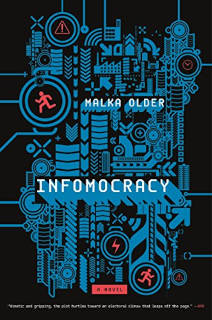
Malka Older’s acclaimed Infomocracy lies at the convergence of politics and technology, data and democracy and how software could alter our way of living and public institutions through the social and technical engineering of elections. At the heart of the world of Infomocracy is a behemoth corporation called Information which holds all the world’s data including that of every citizen. Set in a time when nation-states don’t exist as we know them and the world is divided into voting blocs called ‘Centenals’, with each centenal consisting of exactly a lakh people, and where CEOs are statespeople, Infomocracy unfolds over the backdrop of the third worldwide election with parties vying for a global Supermajority. The worldbuilding is excellent and the narrative is as immersive as it is engaging. Infomocracy will have you thinking about the power of technology and politics in a new light. And yes, it’s also a thriller with a lot of action with katana vs flamethrower fights as well.
2. Analog/Virtual: And Other Simulations of Your Future by Lavanya Lakshminarayan
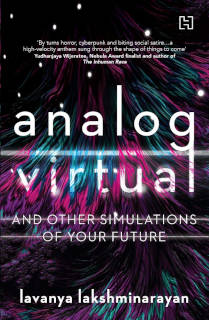
In Lavanya Lakshminarayn’s award-winning debut, Analog/Virtual, we see what happens when “meritocracy” is taken to its logical extreme. In this version of the future, Bangalore has been privatised like other cities across the world, and is now called Apex City and run by the powerful Bell Corp based purely on a universal system of merit that determines an individual’s worth to society. Bell curves divide the population into the titular Virtuals, the haves of this city and the Analogs, the have-nothings. In Apex City, ‘Productivity is paramount’ and ‘Algorithms are infallible’ and its residents navigate through life dancing to the beat of the algorithm re-engineering their opinions, values and their whole life in search of that noble goal called “success”, while those on the other side of the bell curve plot rebellion. Told as a series of engaging interconnected stories, Analog/Virtual will have you thinking about a lot of things, including our tech dependency, of being performative and signaling on social media, an ever-increasing reliance on algorithms to make the decisions for us, and lots more.
3. Numbercaste by Yudhanjaya Wijeratne
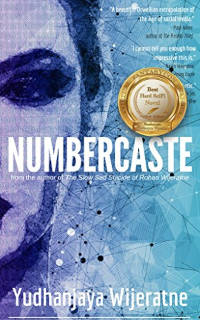
Described as ‘Black Mirror meets the Circle meets 1984’, Numbercaste by Yudhanjaya Wijeratne is set in the near-future and depicts the world of the 2030s as one driven by social networks, fuelled by Big Data to enable and enforce an algorithmically-enforced caste system, but one that is transparent (no more corruption) and equal (the artist is as important as the billionaire and scientists as well-known as celebrities). Numbercaste is a tale told through the eyes of an employee at NumberCorp, a corporation that is using data to build a new society—one where everyone’s social circles are examined, their activities quantified, and their importance distilled into the all-powerful Number. A society where everything from your home to your education to entry at the local nightclub depends on an app that states exactly how important you are. If it sounds familiar, it is because it may remind you of China’s social credit system, but Numbercaste—like any good science fiction—extrapolates this at a global societal level to see what its implications could be, and is sure to leave you thinking long after the last page is turned.
4. Machinehood by SB Divya
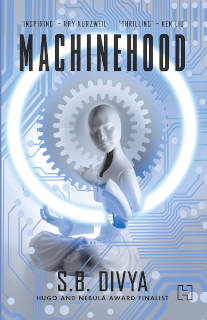
The futurist Ray Kurzweil calls it “inspiring” and Machinehood by S.B. Divya is indeed so. Set in 2095, and people have pills for everything: to make them stronger, to give them bursts of speed, to help them focus, even to stay alive by protecting them against designer diseases, all to compete with artificial intelligence in a highly competitive global gig economy. Things kick into high-gear when an executive bodyguard, Welga Ramirez’s client is killed in front of her by the Machinehood, a mysterious terrorist group that issues an ultimatum to pill manufacturers to stop production and needless to say this causes global chaos. The action shifts from India to the US to out-of-this-world action while Welga runs against time to find out who the Machinehood is: are they human? Or machine? Or something altogether new? A novel that asks, “if we won’t see machines as human, will we instead see humans as machines?”, Machinehood is a recommended sci-fi murder mystery thriller that raises some timely and highly relevant questions about artificial intelligence, sentience, labour rights and the gig economy.
5. Chosen Spirits by Samit Basu
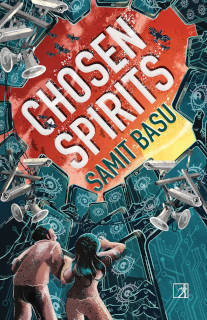
Set in Delhi in the late 2020s, Samit Basu’s techno-social anti-dystopian novel Chosen Spirits was shortlisted for India’s richest literary award, the JCB Prize and with good reason. Through the eyes—and adventures—of its lead protagonists, Bijoyini “Joey” Roy, a “Reality Controller”, and Rudra, we see the India of the future with its surveillance capitalism, a behavioral futures market and a country addicted to the Flow, the social media successor to every social media platform and reality TV rolled into one, augmented reality included. Everything is monitored and monetized, inequality has widened and RWAs weaponised. While it may all look bleak and dystopian, Basu describes the world of Chosen Spirits as a “best-case scenario”. Neo-cyberpunk of the finest kind, Chosen Spirits will throw you into the deep-end of a melange of conspiracy, illegal med-tech, feuding corporates just as much as it does to its protagonists who’d “known the end times were coming but hadn't known they'd be multiple choice."
6. Bandwidth by Eliot Peper
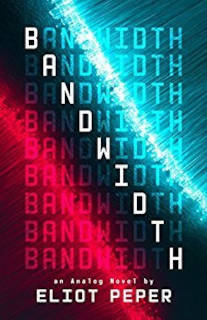
In the near-future world of Bandwidth, Dag Calhoun is a lobbyist whose clients include the 1% who he helps get richer from the catastrophe that is climate change. But it is when working on behalf of another client, Commonwealth—a monopolistic mega-corporation whose network fuels the world’s connectivity—that his world is upended. Commonwealth owns the Feed, which is how people interact with the world, and is as much a character as any of the human actors, and equally flawed. So all-pervasive is the Feed that it forms the very fabric of every person’s every interaction with their world. An activist group, The Island, is now after control of the Feed so that they can take the fight to the mega-corps in the global war over climate change, by manipulating the private feeds of powerful politicians and individuals with a form of digital brainwashing. From power brokers and hacktivists to musings on the dark side of ubiquitous technology, feeds and algorithms, geopolitics in the time of climate change and surveillance, Bandwidth throws the reader at the centre of it all in one fast-paced, action-packed novel.
7. Infinite Detail by Tim Maughan
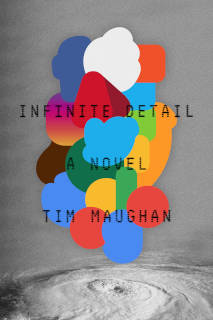
The internet. The engine of all commerce and communication. So critical to the world today, internet access is almost considered a fundamental human right by many. So then, what if the internet was switched off? The end of the world (as we know it)? This is what Tim Maughan’s provocative Infinite Detail examines. At the start, the world of Infinite Detail is just one small step ahead of our own: utterly dependent on technology, constantly brokering autonomy and privacy for comfort and convenience. There’s one holdout though: Croft in Bristol UK, a digital no-man’s-land cut off from the surveillance, Big Data dependence, and corporate-sponsored, globally hegemonic aspirations that have overrun the rest of the world. And then an act of cyberterrorism brings down the internet, switching it off permanently. Infinite Detail examines in quite some detail the Before and the After of this moment, all that lead to it and what comes later. Peopled by etched characters, it makes us take a long hard look at ourselves. Infinite Detail is one of the finest debut novels of recent times and one that has stayed with me long long after I read it.
8. The Ministry for the Future by Kim Stanley Robinson
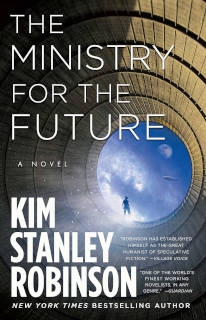
Established in 2025, the Ministry for the Future has one single purpose: To advocate for the world's future generations, “charged with defending all living creatures present and future who cannot speak for themselves, by promoting their legal standing and physical protection.” Science fiction legend Kim Stanley Robinson’s latest novel is the story of this organization, asking if we can geoengineer the Earth back to life. As the climate crisis looms large, it asks some hard questions and paints a grim scenario but at the same time offers a glimmer of hope because of the utopian that Robinson is. A story carried forward with Dos Passos-eque techniques that combine traditional narrative with news reports and encyclopedia articles, etc., The Ministry for the Future focuses primarily on Mary Murphy, head of the titular ministry and the Children of Kali, a group of eco-terrorists also inspired by an Indian heatwave tragedy that kills off an entire village’s residents. In the end, The Ministry for the Future is urgent for anyone even the least bit worried about the impending (inevitable?) climate apocalypse.
9. Autonomous by Annalee Newitz
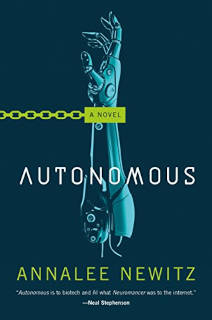
2144. The nation-state is a thing of the past. The world is divided into economic zones controlled by big pharma companies. Human rights have been replaced with private contracts and indentured servitude. It has been almost a century since artificial intelligence gained sentience, and robots—indistinguishable from humans—are in a constant struggle with humans for jobs and resources. Jobs are pay-to-play because the other option is slavery. The only law that’s very actively enforced by the powerful International Property Coalition (IPC) is patent law. Welcome to the world of Autonomous by Annalee Newitz. Into this world a new drug is introduced, Zacuity, a productivity pill designed to give the user almost orgasmic satisfaction in slaving away. But it’s addictive so those who take Zacuity can work themselves to death, literally so. Enter submarine-based outlaw Judith ‘Jack’ Chen, a scientist-turned-activist-turned-patent-pirate who feels responsible for some of it, because she reverse engineered and pirated it for money. So she sets out to find a cure for Zacuity with two IPC agents, Eliasz, a human and Paladin, a newly minted and activated military-grade robot hot on her heels. As action-packed as it is thought provoking, Autonomous explores big ideas about the implications of unbridled capitalism, of people (born or manufactured) as property, of anthropomorphising artificial intelligence and the coming “golden age” of biotech while tackling the themes of property law and piracy, forced labour and voluntary inequality, autonomy and slavery.
10. Radicalized by Cory Doctorow
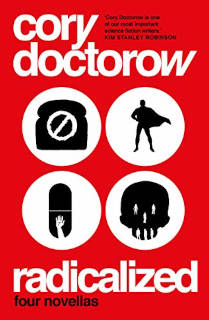
While I would wholeheartedly recommend every novel that journalist, activist and writer Cory Doctorow has written, if you haven’t read any of his fiction yet, Radicalized would be a good place to start. Sub-titled “Four tales of our present moment”, Radicalized is a collection of four novellas. When an Indian company headquartered in Pune goes bankrupt, it’s up to a resourceful refugee in Boston to figure out an alternative, unauthorised methods to toast bread in “Unauthorized Bread”, a story that represents Doctorow’s own beliefs in technogeek activism and community effort driven by crowdsourced hacks. When a man of steel finally decides to take a stand against the system, he finds that he isn’t quite the invincible superhero he thought he was in “Model Minority”. When people who’ve lost their loved ones to cancer because their insurance doesn’t cover certain treatments decide to take some drastic action, one man finds himself at the centre of it all, adrift in the dark web, with his life, career and marriage on the line in the title story, “Radicalized”. When a successful stockbroker decides to wait out the coming apocalypse in a bunker of his own, he thinks he’s covered all bases and nothing can go wrong until it does in “The Masque of Red Death”, inspired by Edgar Allan Poe’s story of the same name. While set in America and concerning itself with the issues its people face, there is a certain universality to these stories because people are the same everywhere and so are the multinational corporations with technology—and its uses and abuses thereof—being the common thread that connects all.
Well, there you have it. Happy reading. Live long and prosper!

